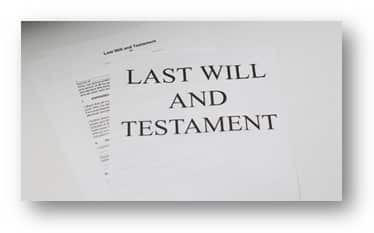When your family is grieving over your loss or illness, they are least capable of making wise decisions. They will be highly stressed and diminished in their thinking. Do your loved ones know what you want regarding assets and affairs? Inform Your Loved Ones What You Want Upon Your Death or Incapacitation.
Get the most from your estate planning attorney. Here is the essential list of items you will need to develop with your lawyer. Avoid the extra costs and wasted time. Get your “ducks in a row” before it’s inevitably too late!
We are regularly reminded of life’s uncertainties. In these unprecedented times, it’s completely natural for people to begin questioning whether they have their legal affairs in order so that their loved ones and assets are protected if the unexpected should happen. However, surveys have shown that an overwhelming number of adults do not have an estate plan prepared.
Now, more than ever, it’s a critical consideration to prepare your estate plan, whether you are a health care worker, teacher, first responder, or just about any other individual. The fact remains that its good advice for every individual to have an estate plan, regardless of an immediate health threat.
Having your estate information well-organized can save your family and heirs thousands of dollars in legal, accounting, and administration expenses. Having this information available to your agent named in your medical power of attorney and durable/financial power of attorney in the event of your disability would make your agent’s job enormously easier. These suggestions apply to each spouse in a marriage.
Here is a list of what to assemble to make life easier for you and your family:
- Personal Information
Birth certificates (for you, your spouse, your children); Social Security number and any benefits information; Marriage certificate, if appropriate; Divorce decree from a prior marriage, if any; Discharge papers for veterans’ benefits; and Citizenship papers if a naturalized citizen.
- List of Contacts and Contact Information
Your accountant or tax adviser; Attorney and investment advisors; Primary care physician; Banker; Auto, home, and liability insurance agent; Life insurance/annuity agent; and Children or other beneficiaries under your Will or Trust.
- Life Insurance and Long-term Care Information
The current annual policy statement for each of your life insurance policies. Destroy any life insurance policies that have lapsed; Up-to-date life insurance beneficiary information, i.e., who gets the proceeds upon your death; and copy of long-term care insurance contract (the specific terms of this contract are extremely relevant, along with a recent statement of current benefits). If you never make a claim, your executor may be able to receive a partial refund of the last premium you paid.
- Retirement Benefits
Recent statement for IRAs (Roth, SEP, or traditional); Current IRA beneficiary information; Recent statement for any pension, profit-sharing or 401(k) benefits; Current beneficiary information on pension, profit-sharing or 401(k) benefits; Information on any group benefits (life, health, or retirement benefits), including any benefits that continue after retirement such as reduced group insurance; and Recent statement from any nonqualified (non-IRA) annuity beneficiary information or nonqualified annuity.
- Investment Documents
Recent statements for all non-retirement investment accounts; and pay on death or transfer on death (POD or TOD) information if accounts are POD/TOD. If the account is payable on death, who is your named beneficiary?
- Bank Accounts and Notes Receivable
Recent statements for cash accounts (checking, savings, money market); Pay on death beneficiary if accounts are POD/Survivorship; and Copies of any promissory notes evidencing money owed to you. Show current balances, and include amortization schedule if available.
- Digital and Online Account Information
Log-in names and passwords for: (i) investment accounts; (ii) checking and savings accounts; (iii) retirement accounts; (iv) Facebook; (v) LinkedIn; and (vi) email accounts.
- Health Care Documents
Copy of Medicare, Medicare supplement, and Medicare D (drugs) insurance ID cards; Medical power of attorney; Overview of personal medical history, including a summary of drugs you are taking; HIPAA Authorization to release health care information to the agent named in the medical power of attorney; and Directive to Physicians (a/k/a living will), any DNR orders (“do not resuscitate orders”), and anatomical gift wishes.
- Proof of Ownership
Copy of deed(s) to homes and other property for personally owned real estate, and a copy of a recent property tax bill for each; Recent mortgage statement (or copy of satisfaction if the mortgage is paid); Copies of vehicle titles (car, boat, motorcycles); Stock certificates, EE Bonds; Closely held corporation share certificates, Partnership agreements, LLC formation, and operation agreements, and membership interest certificates, relevant employment contracts or compensation agreements if benefits are continuing; Personal property inventory, (consider making an electronic or video recording of valuable personal property).
- Debts and Obligations
Apart from monthly reoccurring household items, a list of debts you owe and to whom; and copies of current notes payable and mortgages where appropriate, and an amortization schedule if available.
- Tax Information
Copies of your recent income tax returns, and contact information for your tax preparer. Tax returns are an essential cross-check to see if all assets have been accounted for; and Copies of the latest gift tax return (if any) and a notation where old returns can be found.
- Funeral or Burial, Cemetery deeds;
Prearranged funeral directions with the name of the funeral home (these should be in the possession of the person most likely to make arrangements — probably not in a safe deposit box which may not be found until after the funeral); and consider making a first draft for an obituary (you know more about yourself than anyone else and know what was important for you).
- Estate Planning Documents
Most recent Last Will and Testament (if you do not have the ‘original’ please indicate the location of original signed will); Trusts documents for any trust you created which still has assets, any trusts created by someone else (parents, spouse) where you are either beneficiary or trustee and where the trust still has assets; if a trust is obsolete and has no assets, consider making a notation on the trust document; and Durable/Financial power of attorney (just keep the most recent one) and consider providing a copy to your named agents (before you name your agent in the power of attorney, it’s always a good idea to ask them first if they are willing to accept that responsibility); Copies of prenuptial or marital agreements; and Copies of any recorded Transfer on Death Deed, if applicable.
- Safe Deposit Box
Note location and number of safe deposit boxes and location of keys; Make a list of persons having access to the SD Box (consider naming at least one trusted individual as a person having access); Keep an inventory of what is in the safe deposit box; Make sure your safe deposit box is accessible after you die (e.g., spouse, the child is co-owner); and a copy of homeowner’s or specialty insurance schedule where any jewelry, artwork, guns, are listed.
Conclusion

With the increased uncertainties in the times we are living in, the need for Estate Planning and advice from Probate Attorneys has become more evident.
- a last will and testament
- a statutory durable power of attorney
- a medical power of attorney
- directive to physicians
- HIPAA release
- sometimes a trust
After the initial attorney conference, it generally takes about a week to prepare and assemble the various estate planning documents before they are available for the client’s review. Once the client is satisfied that the estate planning documents reflect the proper disposition of the client’s estate and management of financial and health care decisions, the client would then typically go to the attorney’s office for the execution ceremony.
Nick C. Caridas, Attorney at Law https://caridaslaw.com 832-723-6223

